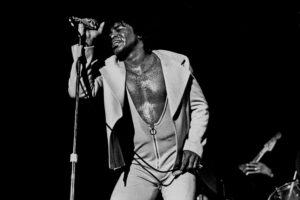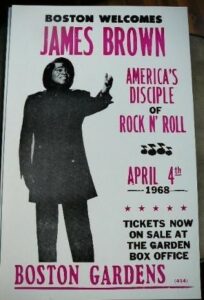By Sharon Oliver
Contributing Writer
BOSTON – Although it may sound cliché to say, “music has charms to soothe the savage beast,” there is some truthfulness to the phrase. If there is one commonality most people share it is a love for music. It is truly universal and in April 1968, singer James Brown’s historic concert at the Boston Garden drove the point home when it mattered and was needed the most.

Photo/Wikimedia Commons
Civil unrest following King assassination
Almost immediately following the assassination of civil rights leader Dr. Martin Luther King, Jr., the nation was faced with civil unrest. President Lyndon B. Johnson had declared a state-of-emergency. Riots and looting were widespread. The Roxbury and South End sections of Boston had suffered uprisings and fires and tensions were high. Brown’s appearance at the Garden had been scheduled for months but this meant Mayor Kevin White had another dilemma. Should he cancel the event to appease those worried about ensuing violence or move forward to please those less fearful?
A young African-American city councilman named Tom Atkins proposed carrying a free, live broadcast of the concert in hopes of keeping as many residents as possible at home watching television rather than being out on the streets. According to James Sullivan, author of “The Hardest Working Man: How James Brown Saved the Soul of America,” Atkins had a blunt message for Mayor White. “You can’t cancel the James Brown show because if you do that, you’re going to have 14,000 kids showing up at the Boston Garden finding out by a piece of paper stuck on the door that the show has been canceled,” said Atkins. “And, if they’re not already angry and distraught over the murder of Dr. King, now they’re really going to be mad.”
Televising the concert
Atkins and White convinced WGBH on short notice to air the show but persuading the Godfather of Soul took some doing. Brown stood to lose approximately $60,000 if his concert was shown on television due to a non-compete agreement related to an upcoming televised concert. Mayor White made the decision to meet Brown’s financial needs and Boston did indeed see less crime on that night.

The concert was the subject of a 2008 PBS documentary titled, “The Night James Brown Saved Boston.” The performance was described as gripping, the speeches inspiring and the charismatic showman was widely credited with helping to maintain a degree of peace and calm in the city. Jimleboeuf7685 wrote on Facebook:
“I’m 67, white, and barely remember all this. Right now, I’m livid and I’m crying. All the assassinations of so many great leaders, AIDS and crack pushed through every city in America, a welfare system purposely designed to separate fathers from their families, and on and on and on. I always knew James Brown was a great entertainer, songwriter, and musician. Now I know he was a great man also.”
Trose202 added: “I’m from Boston and I really did enjoy watching this concert so thank you for uploading this video.”
A relatively strife-free night
At one point during the concert, a few male fans climbed the stage, and policemen began forcefully pushing them back. Brown urged the cops to back away before things got volatile and then addressed the crowd, “Wait a minute, wait a minute now WAIT! Step down, now, be a gentleman. Now I asked the police to step back, because I think I can get some respect from my own people.”
It worked. While many cities across the country continued to experience turbulence and mayhem, Boston remained relatively strife-free on that Friday night.
RELATED CONTENT:
Janis Joplin’s last concert was in Boston
‘Summerthing’ concerts kept Boston cool during hot summers in the sixties and seventies
Boston Tea Party concert venue featured iconic 1960s rock bands












